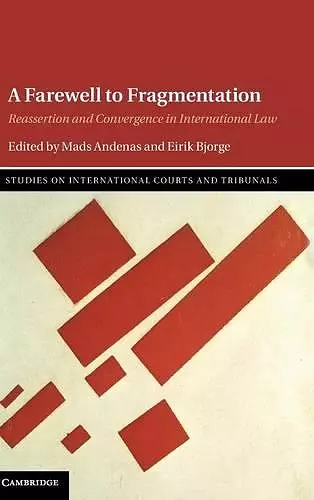A Farewell to Fragmentation
Reassertion and Convergence in International Law
Mads Andenas editor Eirik Bjorge editor
Format:Hardback
Publisher:Cambridge University Press
Published:9th Oct '15
Currently unavailable, currently targeted to be due back around 4th July 2025, but could change
This hardback is available in another edition too:
- Paperback£49.00(9781107442436)

Explores the role of the International Court of Justice in the re-convergence of international law.
Exploring the role of the International Court of Justice in the re-convergence of international law, this book contends that the court's jurisprudence is transforming traditional concepts such as sovereignty, rights and jurisdiction and in so doing is leading a trend towards the reunification of international law.Fragmentation has been much discussed as a threat to international law as a legal system. This book contends that the fragmentation of international law is far exceeded by its convergence, as international bodies find ways to account for each other and the interactions of emerging sub-fields. Reasserting its role as the 'principal judicial organ of the United Nations', the International Court of Justice has ensured that the centre of international law can and does hold. This process has strengthened a trend towards the reunification of international law. In order to explore this process, this book looks at fragmentation and convergence from the point of view of the centre of the International Court and of the position of other courts and tribunals. Featuring contributions by leading international lawyers from a range of backgrounds, this volume proposes both a new take and the last word on the fragmentation debate in international law.
'The book provides what is clearly missing in the fragmentation debate, that is, empirical evidence from the practice of courts and tribunals demonstrating the processes through which fragmentation and convergence occur. [The book] also succeeds in doing something that few multi-contributor volumes in law are able to achieve, that is, to construct a clear argument that runs throughout the entire book. The editors advanced a hypothesis and structured the chapters in such a way so as to allow for this argument to be developed through the course of the volume. Each chapter can be read as a standalone contribution, yet the book should be read as a monograph in order to view the development of the argument.' Jed Odermatt, International Journal of Constitutional Law
'The potential audience of A Farewell to Fragmentation should include anyone, including academics, students, and practitioners, who is interested in the debate(s) over fragmentation in international law. Since its overall argument is that fragmentation is now outweighed by its opposite, it may also interest those who are tired of hearing about fragmentation.' Sondre Torp Helmersen, Leiden Journal of International Law
ISBN: 9781107082090
Dimensions: 235mm x 159mm x 39mm
Weight: 1000g
604 pages